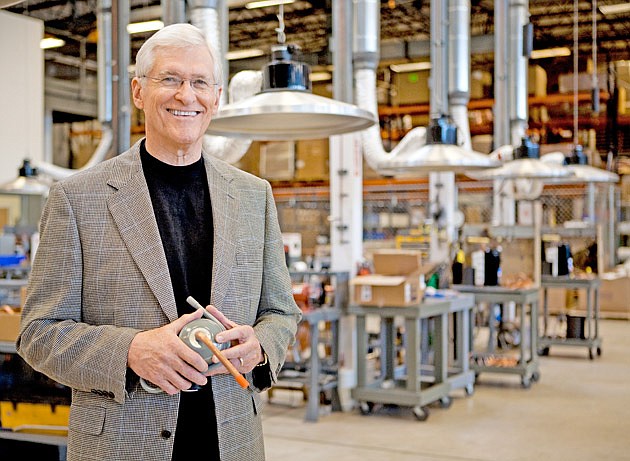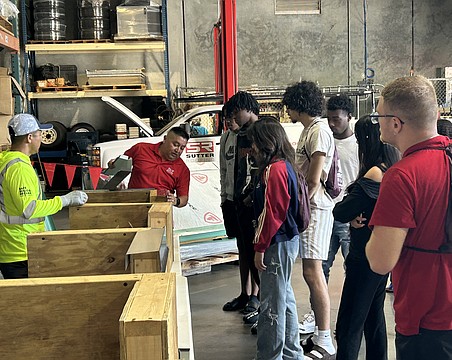With a new law and the green movement on its side, EarthLinked Technologies is ready to take off with geothermal heat pumps.
Its customers stretch from Australia to Alaska, but Lakeland-based EarthLinked Technologies wants a bigger audience. New laws and the green movement are on its side. Awareness and finances stand in its way.
So EarthLinked — which makes and installs geothermal heat pumps that use the earth's temperature instead of electricity for heating and cooling — is looking for a financial partner.
It is also getting out to conferences and other events around the world to tell its story.
“It is very exciting to be on the cutting edge of technology in a time we're in with very fast information flow,” says Hal Roberts, chief executive officer.
At the same time, Roberts admits that it is a huge challenge. He is competing against entrenched corporate giants. Venture capital has been more scarce. “It is very difficult for a small company to gain awareness and credibility for innovations,” he says.
Fortunately, it has the Internet. And independent verifications of its technology from the U.S. Solar Energy Center and the U.S Environmental Protection Agency. And nine U.S. patents. And nine international patents.
“That can dispel doubt,” Roberts says.
EarthLinked is getting inquiries from around the world.
Last year, President Bush signed the Emergency Economic Stabilization Act of 2008, which offers a tax credit of 30% of the total investment, up to a maximum credit of $2,000, for all groundwater geothermal heat pump installations. A tax credit of 10% of the total investment is available for commercial installations.
Beginnings
Despite the recent green movement, EarthLinked was born during the energy crisis of the 1970s. Robert Cochran, the assistant managing director of Lakeland Municipal Electric, began working at home on a way to use the earth as a heat source to heat water.
In 1980, Cochran formed the company with the help of Roberts, the attorney for Lakeland Electric.
They worked for 28 years to develop the company, primarily working on space heating and cooling. The first 15 years were all research and development.
In early 2000, EarthLinked finished a successful pilot project in Connecticut to heat large quantities of water. The U.S. EPA then did a 15-month test of the technology at Sun City Center. It verified a 75% electricity savings to heat water and a 75% reduction in emission of any pollutants, including greenhouse gases.
Ten electric utilities held successful demonstration projects with the technology in Florida, Michigan and Oklahoma.
EarthLinked is hoping the tests will propel growth in the lodging, health care, multifamily housing and other industries that use large quantities of water, such as 2,000 gallons a day or more.
EarthLinked's systems use the constant temperature of the earth, around 75 degrees in many areas, as a way to heat or cool the air or water in a home or office. About half of the sun's rays are absorbed into the earth, maintaining the temperature despite the air temperature.
Equipment represents about a fourth of the cost of the geothermal system. The remainder is installation. EarthLinked digs into the ground to install the product.
To heat a building, the geothermal heat pump pulls heat from the ground and uses it to evaporate a liquid refrigerant. That liquid then goes through a compressor where its pressure and temperature are increased.
The hot liquid then gives up heat by heating cool air that passes through a fan coil.
To cool air, the heat pump reverses the process. The liquid refrigerant passes through the fan coil in the air handler, like the coils in an air conditioner.
EarthLinked makes equipment from 1½ tons to six tons. A commercial water heater is usually a four- to six-ton system. A ton equals 12,000 BTUs, or British Thermal Units.
The cost is about $4,500 to $5,000 per ton, total. The majority of that is installation and the cost of drilling. For most hotels and hospitals, the system costs around $20,000.
Higher sales seen
It faces a minimum of 50 U.S. competitors in the space heating and cooling industry and about 25 in water heating. The majority are very large companies, such as Carrier, Trane and Lennox.
But they use electricity and natural gas to run their heat pumps.
EarthLinked doubled sales in 2006 and saw them rise about 25% in 2008. It has trained 400 installers in the past year and anticipates a 25% sales increase this year.
It has sold equipment in 47 states and in 15 countries. Most of those are for homes and apartments. Small commercial facilities also use the systems.
To boost the commercial side, it is adding sales staff. Sales representatives around the world manage dealers and installers. An installer visits the home or business and prepares calculations for the installation. Cost can vary on location.
Looking ahead, Earthlinked sees a lot of different applications of the technology, including refrigeration. The University of Florida is doing a test applying a geothermal pump to a commercial refrigeration system. EarthLinked is also researching how to apply its heat pump to cool photovoltaic panels on the roof of a building.
“We're looking to partner locally with companies with global reach to expand this globally,” Roberts says.
In its search for a financial partner, EarthLinked realizes what was unthinkable years ago. It may find an electric utility that will join forces with it.
Historically utilities would not be good partner candidates, because they made money by how much the electric meter spins. But that is changing. Last year, the Florida Legislature passed a law allowing the Florida Public Service
Commission to separate electric utility profits from power sales.
“They are preparing and submitting to the PSC plans to deliver energy-saving technologies and renewable energy technologies to end users,” Roberts says.
Last year, EarthLinked moved into a new 30,000-square-foot headquarters office in Lakeland. It installed 11 of its heat pump systems into its office building.
Recently, it got a Leadership in Environmental and Energy Design certification from the U.S. Green Building Council, the first building in Polk County to earn this designation.






